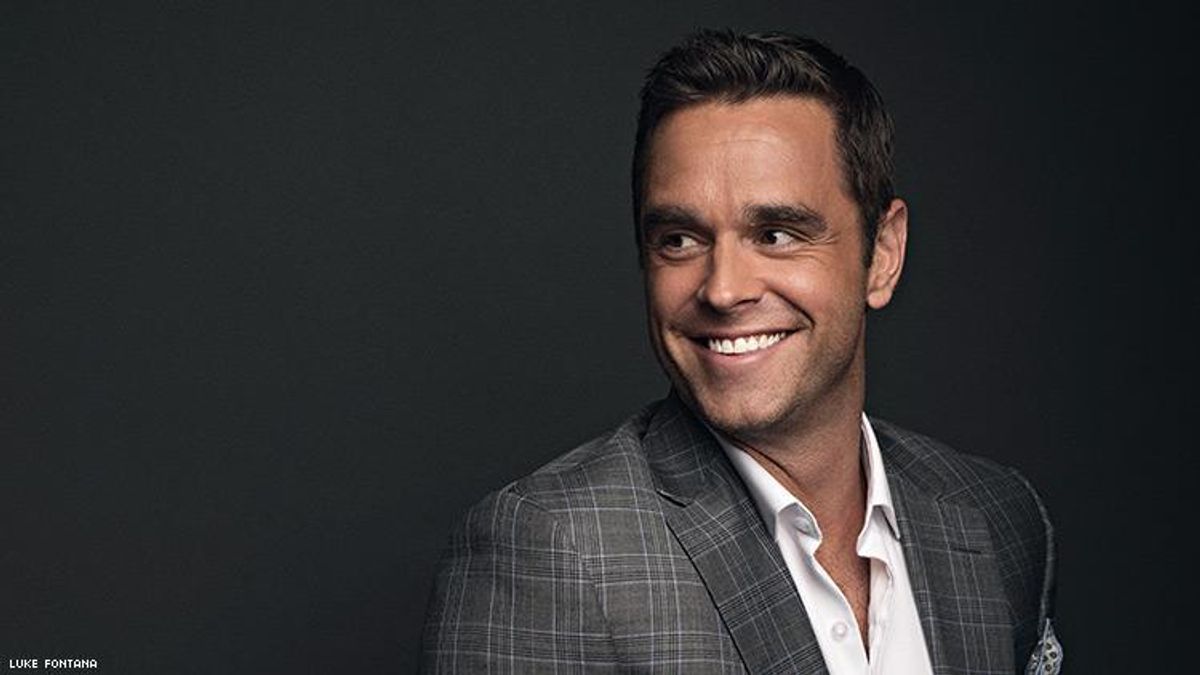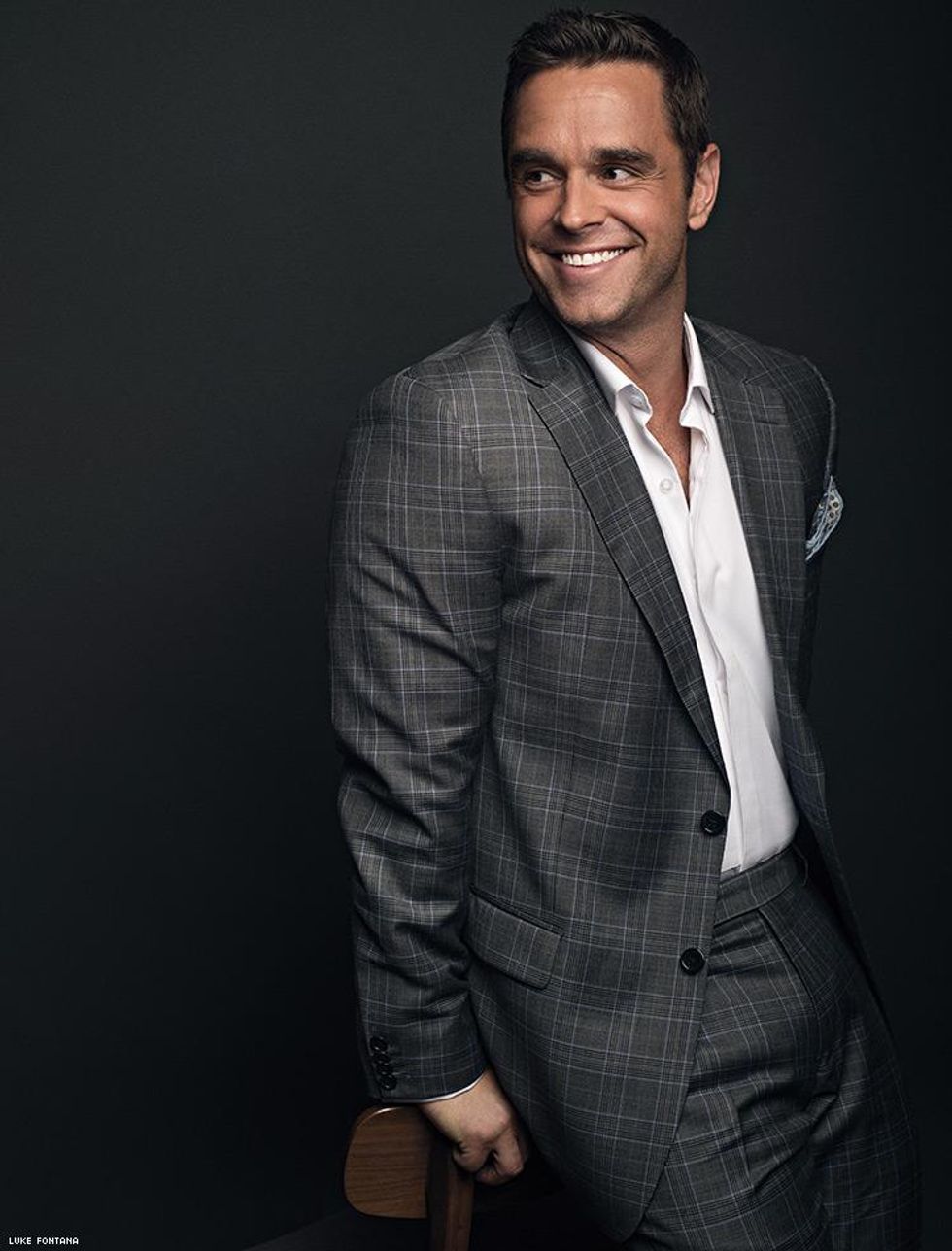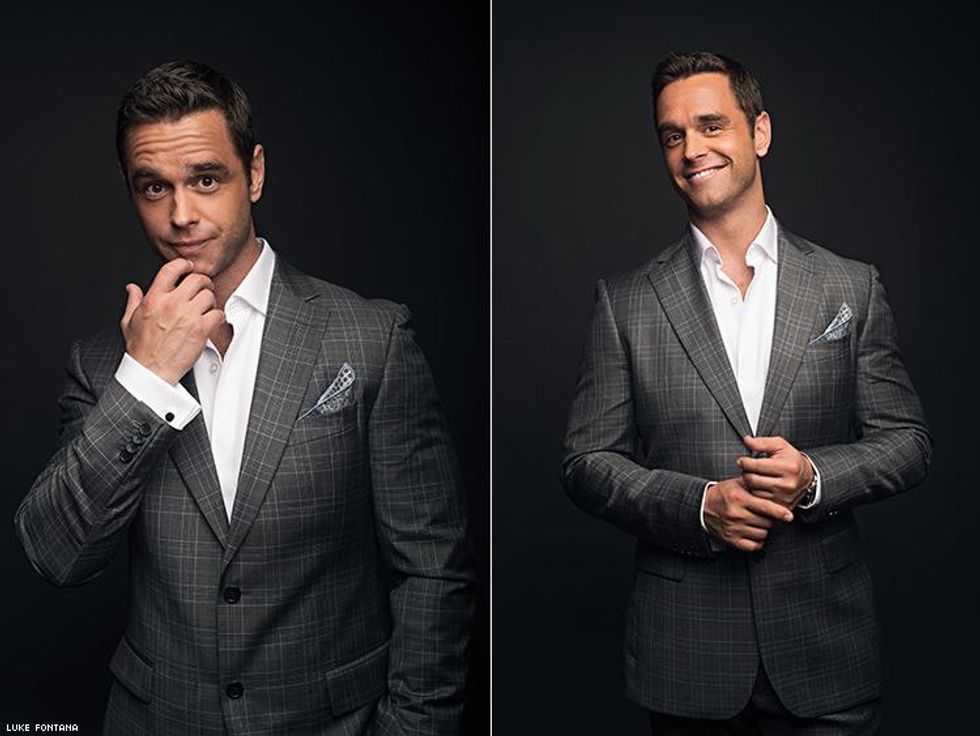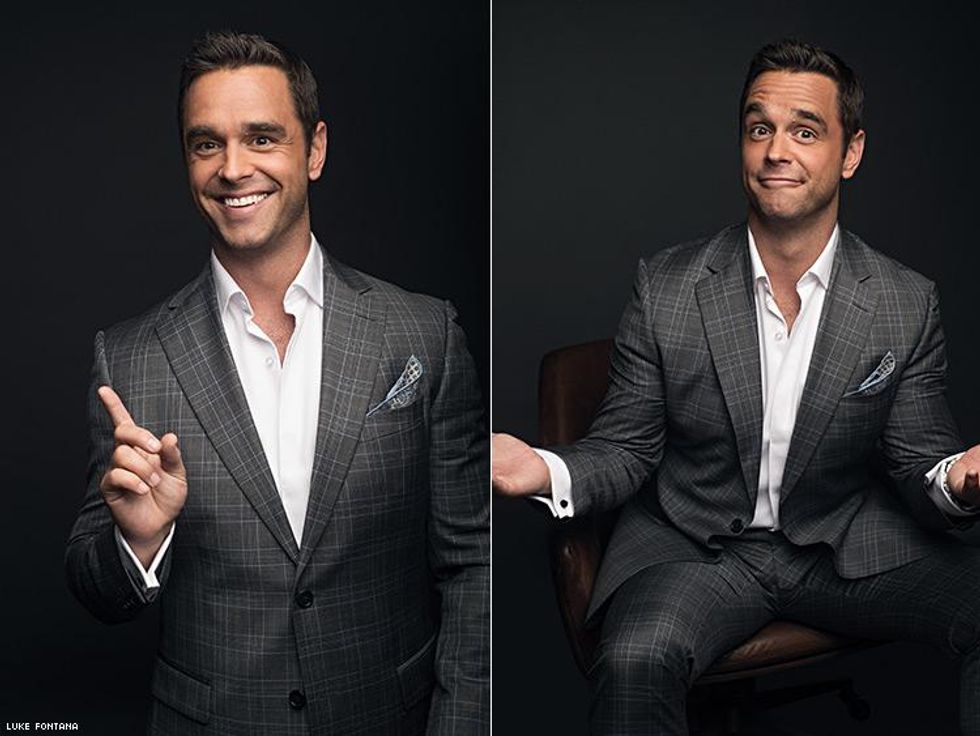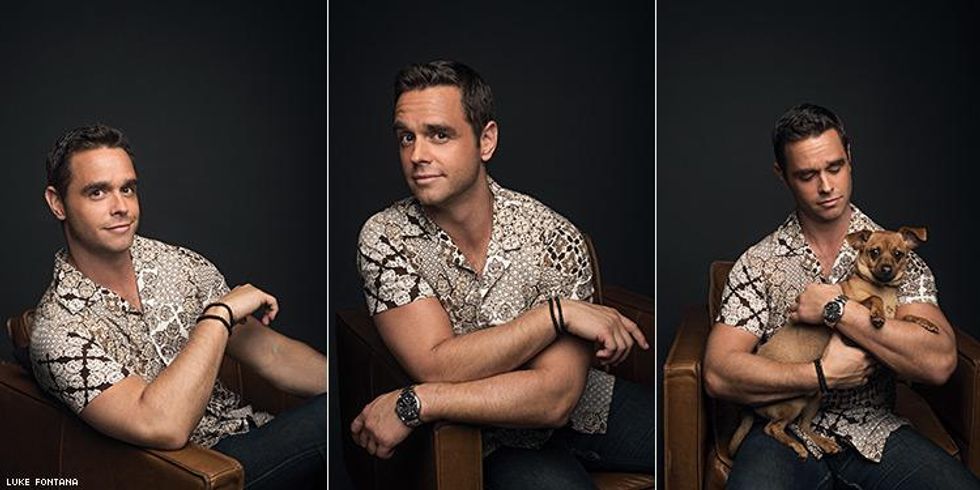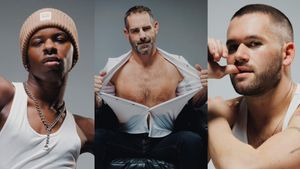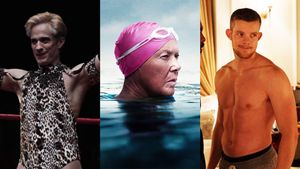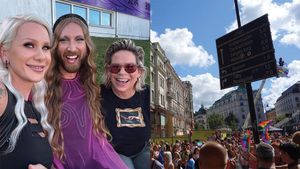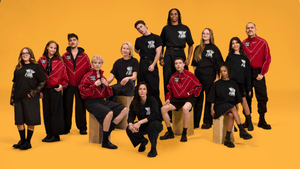
The circumstances leading hunky ABC reporter Karl Schmid to come out as poz were refreshingly nonchalant. There was no vicious ex threatening to out him, nor were there signs of reporters planning on breaking a story. Instead, he chose to come out by posting a now-famous photo wearing an AIDS Memorial T-shirt on Facebook.
“Honestly, I just thought I looked cute in that picture,” admits the Australian native, an on-camera reporter for ABC in Los Angeles and the former cohost of Logo’s Operation: Vacation. “I was going out to happy hour with some friends, so I threw it on. And while out I said, ‘Will you do me a favor — can you get a picture of me in this thing? Because at some point I want a post wearing it.’”
It’s the sincere authenticity of the post that made it go viral.
“Hi. I’m a 37-year-old HIV-positive man who has been poz for almost 10 years,” he wrote. “I work in television. And on the side of the camera where, for better or worse it’s considered ‘taboo’ for people ‘like me’ to be ‘like me.’ For 10 years I’ve struggled with ‘Do I or don’t I?’ For 10 years the stigma and industry professionals have said, ‘Don’t! It’ll ruin you.’”
The off-hand nature of Schmid’s coming out doesn’t reveal the details of those 10 years of handwringing and uncertainty underlying the potentially career-damning decision of a TV personality — who happens to be viewed in 350,000 homes a night — to come out HIV-positive. That underscores the profundity behind his choice and what was at stake for him to become an advocate for other people living with HIV, too.
Schmid’s Facebook post concluded, “But, for anyone who has ever doubted themselves because of those scary three letters and one symbol, let me tell you this: You are somebody who matters. Your feelings, your thoughts, your emotions count. And don’t let anybody tell you otherwise. I’m Karl Schmid, and I’m an HIV-positive man!”
For Schmid, coming out as poz was his way of controlling the narrative and taking agency over his life. “I made it about me,” he says. “I had been sort of on and off about it. I thought, you know, one day I would like to be able to be more public about this so I could get passionate about this stigma thing and fighting it.”
The intensity of the public’s response took Schmid by surprise, he says, because “my status prior to that didn’t come up much. I would take one pill in the morning with my multivitamin and whatever else, and that’s it.”

Touched by the outpouring of love that he’s received, Schmid says, “Honestly, part of me is flattered and I am proud, but I’m also sorry. Sorry that in this day and age this is still such a big deal.”
In the United States, he argues, “We are not doing enough and haven’t come far enough to fight the stigma around HIV. We’ve seen things like PrEP, but there are a lot of people my age who still think of this as a death sentence.”
Just as his Facebook post was going supernova, Schmid headed to India for a family vacation, the timing of which he says made one response to his post particularly moving.
“This guy said, ‘All I want to do is be a flight attendant. That’s my passion. But I can’t because I have to take an HIV test.’ He wanted to fly with a Middle Eastern airline and unfortunately, with this particular airline, being HIV-positive precludes you from working for them.”
It reminded Schmid that even in America as recently as 2009, “you had to declare on an immigration form that you were HIV-positive, because it is considered a communicable disease.” Indeed, Immigration Equality, the nation’s leading LGBT immigrant rights organization, reports that “from 1993 until January 4, 2010, HIV was considered a ground of inadmissibility, meaning that HIV-positive foreign nationals could be denied short-term visas or applications for lawful permanent residence simply because of their HIV status.”
Schmid himself is an immigrant — or a child of the world. Born in Australia, Schmid’s family moved around a lot due to his father’s job in the garment industry. Schmid’s acting career was the one constant, following him from Australia to Fiji, to New Zealand. There, from the ages of 13 to 18, he starred as the host of one of country’s top live-action children’s TV shows, What Now? He got that gig after producers saw him on TV New Zealand’s drama, Mel’s Amazing Movies (about a group of friends who embark on wild adventures making home movies).

Schmid’s life suggests he was destined to be a TV star. His first brush with fame was on TV in his native Australia, when he appeared on the long-running soap opera Neighbours. Schmid’s brother was one of its stars. Kylie Minogue also came from Neighbours, as did Russell Crowe and Guy Pierce. Back in the ‘80s, it was the biggest thing on TV in Australia and the United Kingdom.
Schmid always loved “the world of make believe, of being on a TV show and it was exciting, and I remember — as embarrassing as it is to say — I would play TV host in my head. I used to pretend to the point of even saying ‘Goodnight Australia,’ every night before I went to bed.”
At 19, he started working in event management and it was there that Schmid got interested in being on the production side of the camera. It’s also been a successful path for him.
“I like that I’m able to be on camera as a presenter or host, but at ABC I also produce and write,” Schmid says. “I’m equally happy behind the camera as I am on camera. I just finished a show for the Game Show Network and I just produced a one-hour documentary on Meghan Markle.”
Beyond concerns over whether coming out would impact his career, Schmid says disclosing his status while dating has been “the hardest thing for me personally living with HIV. The stigma. I’ve had someone throw a drink in my face, I’ve had someone tell me, ‘Well there’s no point in us carrying on with this dinner’ and these are from other gay men: the one part of the community you think would be more understanding.” (Or at least more educated.)
Schmid believes things are finally starting to change. “I think the younger generations — people in their teens and 20s — are much more up to speed with things versus people my age group and older.”
Now in his mid-30s, Schmid says, “I think that’s because they weren’t around when the epidemic really hit the fan, and so they didn’t see people dying.”
But he remembers. As a kid, Schmid says, “I grew up with the most horrendous TV ad campaigns designed to place the fear of God in people about HIV [and] AIDS.”
The ad Schmid refers to is the notorious Grim Reaper television ad that ran in Australia for nine weeks in 1987 before it was pulled from the air over public outrage. The commercial, filmed in black-and-white, features the Grim Reaper in a smoky bowling alley where the pins are people, including children and a woman holding a baby. The Grim Reaper bowls, and knocks all but the mother to the ground. She looks panicked, ready to run, when she is picked off by the Grim Reaper and the baby falls from her arms.
Schmid says he was about 7 when he saw it and remembers “watching this terrifying ad and — look, scare tactics had to be used because no one knew what this thing was or how to stop it, so I get the ‘why’ — but the negative effect of that ad is that if it’s still engrained in my head I know it’s engrained in other peoples’ as well. That fear is still very real to me.”
Schmid has friends in their 40s who have said to him, “‘You know, considering everything I did in the ’90s, I should have HIV. But I just don’t want to know because if I do it’ll destroy me.’ And I just want to scream! Don’t they know that’s the kind of ignorance that keeps HIV going?”
He’s an advocate and educator, but Schmid is also giving Ryan Seacrest a run for his money in the hosting, red carpet, entertainment world.
Schmid deflects questions about being a journalist, at a time when the news is under attack, by arguing “mostly what I do is entertainment reporting or lifestyle-related stuff. I consider journalists people who really get out there and put it all on the line.”
He adds, “I can’t speak on behalf of ABC — I don’t think that’s right — but I think the truth now is more important than ever. Certainly, I know within an organization like ABC, our journalists and news teams take what they do very seriously, and they are all very passionate about it, especially when they’re being called ‘fake news’ all the time. I think it really fires up the news team, to prove the point that now more than ever the media’s role is important!”
Schmid points to the recent Netflix My Next Guest Needs No Introduction with David Letterman episode with Jay-Z as an example of what he means.
“Jay-Z made a really good point about what’s going on politically in this country at the moment,” Schmid recalls. “We have elected someone who is very polarizing and it is forcing people to have conversations that needed to be had. We thought we had progressed a great deal with having had a black president, while the reality is, we are unfortunately learning that maybe that’s not the case. It’s like someone lifted the veil on a dirty dark secret in this country, and while it’s uncomfortable, I think it is necessary, because it is forcing us to have these uncomfortable conversations — whether it be about race, sexual harassment, and #MeToo, or, in my case, HIV stigma. We have to talk about things. If you don’t have a dialogue, you don’t get anywhere.”
Schmid is hopeful that this will ultimately be a cathartic moment in American history. “I like to think of it that way,” he says.
Though he’s poz and proud, Schmid doesn’t let HIV define him.

“I don’t walk around going ‘I’m HIV-positive!’ I just don’t. I’ve lived with it for 10 years. I’m perfectly healthy and a mostly moderately sane person, so when it came to that moment on that Friday evening [when he came out publicly] — I don’t want to come across as sounding douchey — but I was comfortable in that moment. I thought it was a nice photo, and it was my way of putting my story link in with The AIDS Memorial and promoting that T-shirt. That was it. I went to bed that night and didn’t think about it. When I woke up the next morning I noticed it had a bit of traction, and then by 10 A.M. on Saturday morning my Twitter blew up, and then Instagram. You know prior, I’m a nobody with like 2,000 followers, and then the numbers are going up. Then I get an alert about The Wrap writing this up and it’s all going crazy.”
Schmid has come to understand how and why what he did on an impulse affected so many people so profoundly. HIV visibility is so low that when a celebrity or public figure like Schmid comes out, it inspires pride in many people who are still burdened by stigma.
It makes Schmid reflect on the dual and often contradictory impulses the United States inspires, and it reminds him of an anecdote he learned while working many years ago in London
for Dame Edna (née comedian Barry Humphries).
“Edna used to have a line in the show when we were touring the U.S. about how she’s Australian and how she would rather be from a country that was settled by convicts instead of Puritans.”
